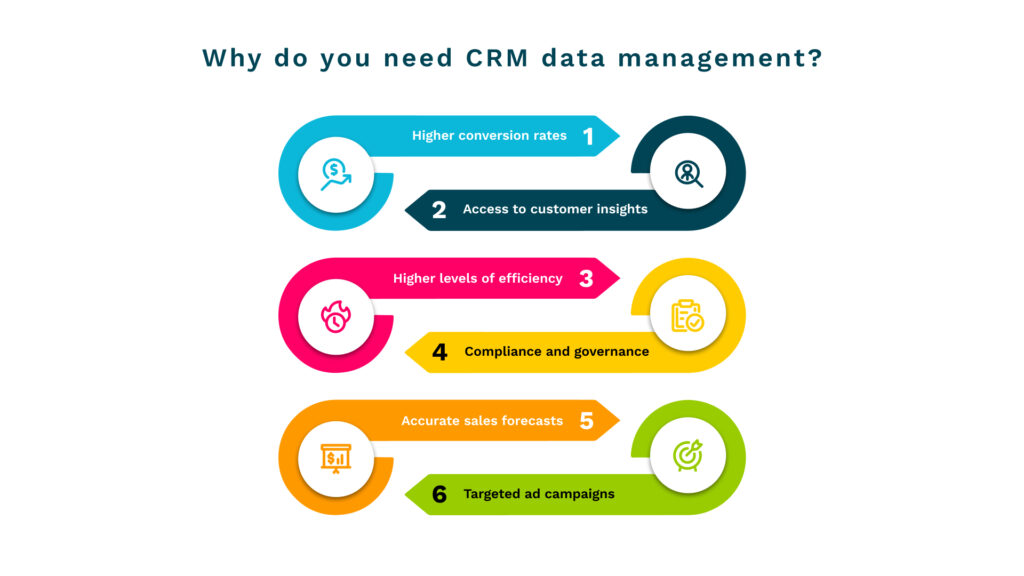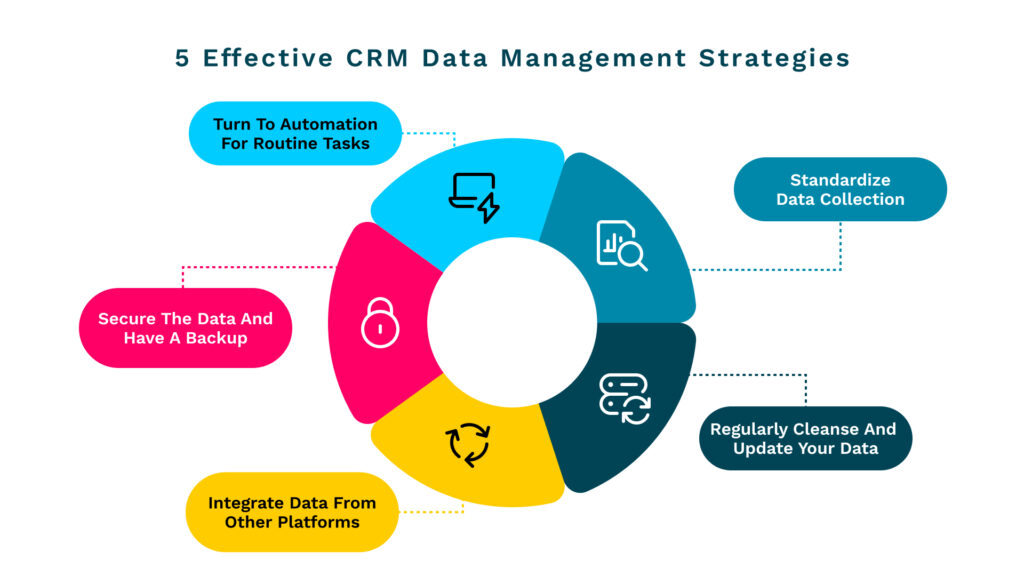
5 Effective CRM Data Management Strategies
Transform your revenue with these 5 powerful CRM data management techniques and get higher ROI from your CRM investment.
Having the best CRM data management strategies in your arsenal can help you prevent several revenue leakages in your business.
Data interactions went up by a whopping 5000% between 2010 and 2020. With this amount of data to handle and manage, businesses need a plan of action. This is where CRM data management comes into play.
In this article, we will reveal tried-and-tested CRM data management strategies that will transform your CRM into a real growth engine.
Let’s get started.
What is CRM Data Management?
CRM data management refers to the process of effectively collecting, organizing, storing, and maintaining customer-related information within a CRM. It involves managing the vast amounts of data generated from customer interactions, purchases, inquiries, support requests, and more.
These perfectly organized datasets are then used by almost all the departments of your business including sales, marketing, customer service, and RevOps.
In simpler terms, CRM data management is like maintaining a well-organized library of customer information. Just as a librarian categorizes and arranges books for easy access, CRM data management involves structuring customer data to make it easily searchable and retrievable for businesses.Hold on, there’s more to it! CRM data management can bring immense benefits to your business which we will discuss now.
Related Resource: 8 Steps to Maintain CRM Data Hygiene
Why Do you Need CRM Data Management?
With a gazillion amount of data lying inside your CRM arises a need to manage it effectively so that you can begin harnessing its power. Here’s how organized and clean data make an impact on your business.

1. Higher conversion rates
When your data is organized, you can quickly identify leads that show genuine interest in your products or services. With a clear picture of your prospects, you can customize your sales pitch and marketing efforts to address their specific needs and pain points. You will also be in a position to aptly score your leads.
This targeted approach increases the chances of converting potential leads into happy customers. The increase in conversion rate can go up to a gigantic 300%.
2. Access to customer insights
44% of customers ignore unprepared sales pitches. Clean data allows you to analyze customer behavior, preferences, and buying patterns more effectively. You can identify trends, popular products, and areas for improvement.
Armed with these insights, you can create personalized customer campaigns, pitches, and offers that resonate with your audience, fostering stronger customer loyalty and repeat business.
3. Higher levels of efficiency
A well-organized CRM database ensures your team can access the right information at the right time. It eliminates the frustration of searching for data in different places, streamlining workflows and decision-making processes. In fact, this data accessibility can shorten the sales cycle on average by 8-14%.
The efficiency boost enables your team to focus on core tasks, betters collaboration and accelerates overall team productivity.
4. Compliance and governance
Keeping your data clean and up-to-date is essential for maintaining compliance with data protection regulations and industry standards.
By ensuring data accuracy and security, you build trust with your customers, reassuring them that their information is handled responsibly. This trust can positively influence the image of your brand and customer relationships. No wonder, 84% of consumers are more loyal to companies that have strong data security controls.
Related Resource: 5 Tips to Build a CRM Data Governance Strategy
5. Accurate sales forecasts
Accurate and organized data helps in making reliable sales forecasts. By analyzing historical sales data and customer trends, you can predict future sales performance more precisely. This helps you to set realistic targets for your teams, allocate resources mindfully, and make informed business decisions to optimize revenue growth.
6. Targeted campaigns
Sales and advertising departments lose about 550 hours in a year due to insufficient data. When your data is clean and organized, you can segment your audience more effectively. This audience segmentation allows you to create highly targeted ad campaigns that resonate with specific customer groups.
As a result, you can optimize your advertising budget and achieve higher conversion rates with ads that reach the right people at the right time.
Now that we understand the benefits of clean data for business operations, it’s time to shift our focus to the next step: exploring effective strategies for managing it.
5 Effective CRM Data Management Strategies
85% of sellers admit having made likely embarrassing mistakes due to incorrect CRM data. Are your reps also making these mistakes?
Well, chances are high.
But the good news is that we have reached that part of the blog where we will reveal the most effective CRM data management strategies that will not only prevent your reps from committing these mistakes but also take your CRM’s ROI to the next level.

Let’s dive in.
1. Standardize data collection
Imagine if everyone in your team used different formats for storing data – what a real mess it’d be. Standardizing data collection means setting s standard policy i.e. clear rules and formats for entering information.
When everyone follows the same guidelines, the data becomes consistent, making it easier to work with and understand. Plus, it reduces errors and confusion, ensuring you get accurate insights from your data. For example, use standardized date formats, consistent naming conventions, contact details, and uniform categories for data entry.
Also, make sure only specific people are allowed to enter data in your CRM and not all the employees so that you know who is accountable for which entry.
2. Regularly cleanse and update your data
Regular reviewing and cleansing of data is important to ensure only the relevant data remains in your CRM. The aim is to keep your database neat and tidy, so you can find what you need without any hassle at the right time.
Here’s what you can do. Set a schedule to review your data periodically, say every quarter as stated by Jacky Leiha, CRM expert in one of our podcasts. Look for duplicate entries and merge them, fix any inaccuracies, and delete outdated or irrelevant information. Also, create monthly exception reports. This data cleanup process keeps your database accurate, relevant, and up-to-date.
3. Integrate data from other platforms
Picture your business as a puzzle with many pieces. Each piece represents data from different platforms, like sales, marketing, or customer support. To see the whole picture, you need to fit these pieces together. Integrating data means bringing all that information into one place, like a puzzle board. With everything connected, you can analyze the data more effectively, spot patterns, and make better-informed decisions.
Today, 51% of CRM users think that data synchronization is the major CRM issue. To fix this, you must integrate your CRM with your email marketing software, e-commerce platform, or customer support tools to get the whole picture.
4. Secure the data and have a backup
Just like you’d lock your house and keep a spare key somewhere safe, you need to protect your data too. Data security and investing in robust data security becomes a necessity. Take measures to protect sensitive information from unauthorized access. Implement encryption, strong passwords, access controls, and regular security audits.
Additionally, create regular backups of your data and store them securely, either in the cloud or on an external device. Having backups ensures you can quickly recover data in case of any data loss incidents.
5. Turn to automation for routine tasks
32% of sales reps spend more than 1 hour each day on manual and boring data entry. Automation today is a winning hand for every industry that can automate such repetitive tasks. Here’s how you can start leveraging automation.
First of all, Identify repetitive tasks in your data management process. Then, look for tools that can automate those tasks. Next, choose the automation tool that aligns with your needs and budget. Finally, deploy it and use its automation capabilities to handle the mundane tasks that waste hours of your team’s time.
For example, you may set up automated data entry, automatic email responses, or scheduled data updates. Automation not only saves time but also reduces human errors and ensures data uniformity.
Now, it’s your turn to implement these strategies and make a real difference in your CRM data management process.
Trust Nektar with CRM Automation
Nektar is a power-packed automation platform that comes with extensive data-capturing capabilities. It can even ‘capture-enrich-map’ performance in the most complex deals. It automates the collection of GDPR-compliant contacts, pipeline data, and buyer-seller engagement data to build a scalable, repeatable sales motion.
Its ability to offer a true view of CRM data and co-exist with any of your existing GTM tools makes it a must-have for businesses today. Nektar-powered CRM data can be further fed into your business intelligence tools for more accurate reporting.
Pretty much all you needed, right? Learn more about Nektar by getting in touch with one of our experts.
PUBLISHED BY






